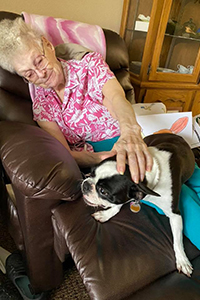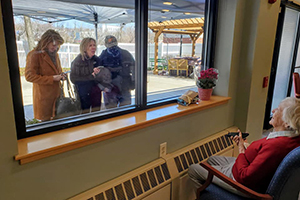BY LISA EISENHAUER
All group activities are canceled for now at Marguerite's House and the dining room of the 106-unit assisted living center, the combination barbershop/salon where residents could normally get a quick trim and the little shop where they could pick up a gift are closed.

Human visitors aren't allowed in because of the COVID-19 pandemic but pet therapists like Royal can still check on Rosie Thompson and other residents at the St. Crispin Living Community in Red Wing, Minnesota. The assisted living center is part of the Benedictine Health System.
"It's quite eerily like a ghost town these days, there's just no one around, except for staff and residents," says Michael Slauter, director of Marguerite's House Assisted Living for Mary Immaculate Health Care Services. Marguerite's House in Lawrence, Massachusetts, is part of Mary Immaculate, which, along with its parent, Covenant Health, is based in Tewksbury, Massachusetts.
Marguerite's House has followed guidance from state and federal health officials that calls for facilities providing services along the continuum of care for seniors to ban visitors and keep staff and residents at safe distances from each other to thwart the spread of the coronavirus. COVID-19, the illness the virus causes, has proven particularly deadly for the elderly population and outbreaks have had devastating effects in several nursing homes around the U.S.
With the normally lively Marguerite's House community now mostly quiet and physically isolated from the outside world, the staff is taking extra steps to help residents stay in contact with that world and with each other through phone calls and video visits. Social isolation can undermine mental health, so the staff is devising activities that connect and engage residents from the comfort and safety of their apartments.
"This population is particularly at risk for social isolation," Slauter notes, adding that the center's two social workers as well as its wellness and activity teams are keeping a close watch for signs that residents' spirits are flagging.
A need for routine, rituals
Sr. M. Peter Lillian Di Maria, O CARM, director of Avila Institute of Gerontology, and her colleague Alfred Norwood say research as well as their own experience show that directors of residential care communities for seniors are wise to monitor residents' mental states because of the mind's key role in overall well-being. The institute is the educational arm of the Carmelite Sisters for the Aged and Infirm of Germantown, New York. The Carmelite Sisters for the Aged and Infirm sponsor, co-sponsor or serve in 19 long-term care facilities.
Norwood calls stress the "basic villain" against efforts to keep residents calm and comfortable. He says stress is driven largely by three factors sure to affect most people amid the pandemic: changes in surroundings, loss of personal control, and loss of social support. When those factors are in flux and life is disrupted, he says, a person's control over their basic behavior can loosen and the stress turn into fear and anger.
For people afflicted with dementia, the changes forced by the social isolation regulations could be particularly confusing and the stress difficult to counteract, Sr. Di Maria and Norwood say. For all residents but especially those with cognitive issues, they say it's helpful if nursing homes and assisted living centers try to stick to normal schedules and routines and let residents continue with activities that are familiar and comforting.
Sr. Di Maria suggests that helping residents maintain their spiritual connections and rituals, by such means as prayer or meditation, is one potential way to help them stay calm. For those with cognitive challenges, she suggests simple tasks, such as looking through books of photos or folding laundry.
In addition, Sr. Di Maria and Norwood say the residents should be assisted to maintain their family and social connections, even if that has to be done through virtual means. They are seeing staffers make this happen in multiple ways in facilities, including through FaceTime phone calls and bingo games conducted with the use of intercoms and call lights.
"They're doing any kind of connectedness that can take place and it's helpful," Sr. Di Maria says.
Giving joy
Danny Stricker, president of Ascension Living, part of St. Louis-based Ascension, says staff at the nursing homes, assisted living centers and independent living communities it operates in 12 states and Washington, D.C., are "striving to provide as much joy as possible during this time." To support residents' spiritual and social needs, he said the communities are airing religious services on closed circuit TV, leading daily prayers and setting up phone and video visits with family members as well as hallway visits among residents and staff.
As caregivers at Ascension Living communities assess residents' physical state, Stricker says they also are monitoring residents' mental health. "We are performing screenings on our residents multiple times a day to check for respiratory symptoms and mental well-being," he says.
In senior housing communities that are part of the Duluth, Minnesota-based Benedictine, staff are also making extra efforts to check on residents' mental state. Jeri Reinhardt, vice president, clinical services and performance excellence, said even at independent living communities where residents are largely on their own, staffers are doing daily drop-ins at every apartment to see how residents are holding up.
At all the communities, she said caregivers are being creative about ways to keep residents active. Some, for example, have arranged hallway karaoke and doorway concerts. They've posted photos of those activities on social media so relatives and friends can see the residents enjoying themselves as they socialize safely.
Creative responses
At Marguerite's House, staffers have used the website signupgenius.com to schedule "window visits" — 30-minute blocks of time where a resident sits at a large window in the dining room and family and friends stand in the patio outside. With the help of cell phones or tablets, they can also chat.

Joan Mahoney enjoys a "window visit" at Marguerite's House, an assisted living center in Lawrence, Massachusetts. The scheduled visits are one of the options for relatives and friends to stay in touch with residents while facility is largely locked down during the coronavirus pandemic. The center is part of Mary Immaculate Health Care Services, which, along with its parent, Covenant Health, is based in Tewksbury, Massachusetts.
"We have a nice comfortable chair that's set up, which is sanitized and cleaned after every window visit, as is the windowsill and the cell phone and anything that we're using," says Tasha Wright, the center's activities director.
And while group gatherings are on hold, Wright and other staffers have come up with new communal activities. Those have included in-room scavenger hunts and team trivia competitions, facilitated with phones and one-on-one visits. In addition, Wright visits residents' apartments to drop off donuts and to offer distractions, such as puzzles and coloring books.
The center's staff also encourages residents to walk the hallways — with assistance at a safe but still helpful distance — and to visit the center's chapel or second-floor patio, where seats have been set up 6 feet apart to allow for appropriate distancing.
Slauter, the center's director, says that meeting the social and spiritual needs of residents is challenging amid all the restrictions. He's proud of his staff for doing what they can in a time that is stressful for them, too.
"I'm amazed every day how people rise to the occasion," he says. "This is a very scary time for everybody."